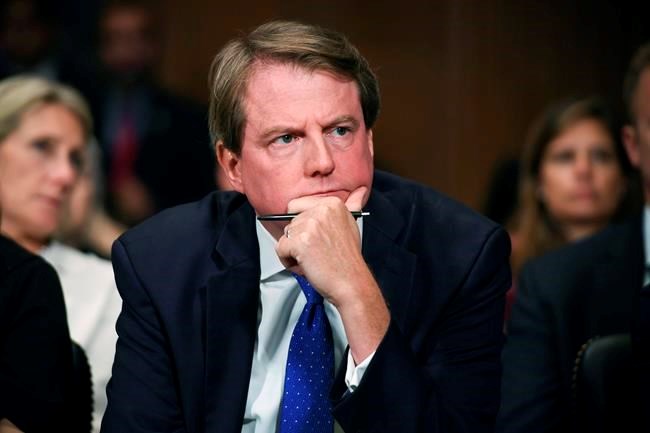WASHINGTON — In a setback for Democrats in Congress, a federal appeals court ruled Friday that judges have no role to play in the subpoena fight between the House and President Donald Trump over the testimony of high-ranking administration officials.
The decision undoes a lower court ruling that would have forced former White House counsel Don McGahn to appear before Congress. It is likely to doom efforts to get other high-ranking officials to testify in House investigations of Trump.
A three-judge panel of the U.S. Court of Appeals for the District of Columbia Circuit issued the 2-1 decision. Lawmakers could ask the full appeals court to weigh in or appeal to the Supreme Court. House Speaker Nancy Pelosi said Friday that she would ask the full appeals court to weigh in.
But time is getting short if the House hopes to have McGahn or other officials testify before November's elections.
The House Judiciary Committee first subpoenaed McGahn in April 2019 as it examined potential obstruction of justice by the Republican president during special counsel Robert Mueller's Russia investigation. Trump directed McGahn not to appear and the Democratic-led panel filed a federal lawsuit to force McGahn to testify.
A trial judge ruled in November that the president's close advisers do not have the absolute immunity from testifying to Congress that the administration claimed.
But the appeals court judges said that the case should be dismissed because the Constitution forbids federal courts from refereeing this kind of dispute between the other two branches of government.
“The Committee's suit asks us to settle a dispute that we have no authority to resolve,” wrote Judge Thomas Griffith, an appointee of former President George W. Bush.
He later added: “The walk from the Capitol to our courthouse is a short one, and if we resolve this case today, we can expect Congress’s lawyers to make the trip often."
He was joined in the decision by Judge Karen LeCraft Henderson, an appointee of President George H.W. Bush.
Judge Judith Rogers, an appointee of President Bill Clinton, dissented. She said her colleagues' opinion “all but assures future Presidential stonewalling of Congress, and further impairs the House’s ability to perform its
A Department of Justice spokeswoman, Brianna Herlily, said in a statement late Friday that the administration was pleased with the ruling.
House lawmakers had sought McGahn's testimony because he was a vital witness for Mueller, whose report detailed the president's outrage over the investigation into Russian interference in the 2016 election and Trump’s efforts to curtail it.
In interviews with Mueller's team, McGahn described being called at home by the president on the night of June 17, 2017, and being directed to call the Justice Department and say Mueller had conflicts of interest and should be removed. McGahn declined the command, deciding he would resign rather than carry it out, the report said.
Once that episode became public in the news media, Mueller's report said, the president demanded that McGahn dispute the news stories and asked him why he had told Mueller about it and why he had taken notes of their conversations. McGahn refused to back down.
If McGahn had been forced to testify, it was unclear his testimony would have included any new revelations beyond what Mueller has already released. Mueller concluded that he could not exonerate Trump on obstruction of justice but also that there was insufficient evidence to prove a criminal conspiracy between Trump's campaign and Russia.
___
Associated Press reporter Mark Sherman contributed to this report.
Jessica Gresko And Eric Tucker, The Associated Press


